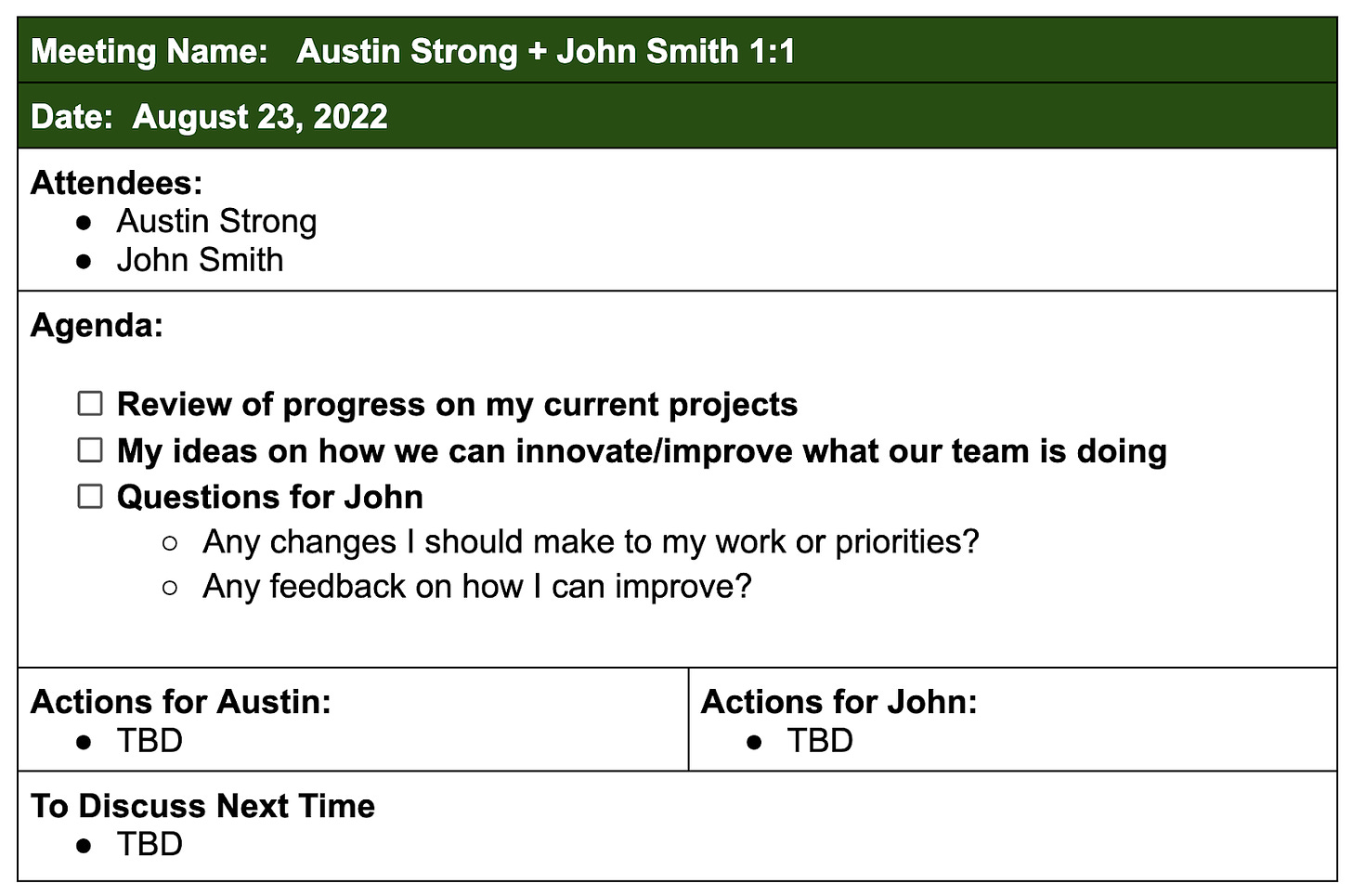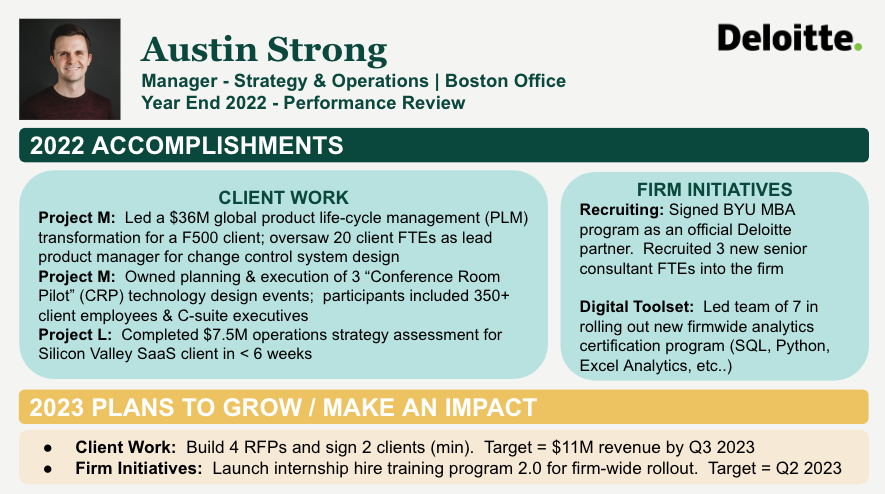What’s the big deal about Year End (YE)?
One of the questions I get asked often by co-workers is “how to do well at their Year End Performance Review”. This question matters to people because “Year End” (YE for short) is where you essentially get your professional “grades” for the year. This of course directly impacts your opportunities for promotion, salary increases, bonus size, etc. It’s worth figuring out, because there is literally money at stake. Though some folks may not have been driven to get straight A’s in school, everyone wants straight A’s when it comes to YE.
Each company does YE reviews differently. Some do it only 1X per year. Others will do bi-annual or even quarterly reviews. Some organizations (usually older / larger companies) have very formal processes and criteria. Other orgs approach YE like the wild west; few rules exist.
Regardless of the situation, there are a few principles I’ve found work well across the board.
This advice may apply most particularly to those who work at companies with very established year end criteria, but the principles should apply even in circumstances where there isn’t a well defined process.
3 Keys for Standing Out at YE
#1: Find Out What You’re Going to Be Graded On
Do your research. Figure out exactly how the YE process at your particular company works and what specifically you’re going to be measured on. Talk to people who are 2-3 years ahead of you in the company (those who know the ropes). Ideally you want to find someone who is the “Hermione Granger” of their class when it comes to YE. You don’t want to take tips from the guy/girl who hasn’t been promoted in 5 years.
Knowing the YE metrics are important because that tells you where you need to focus (ex: if you’re measured on X, don’t spend your time on Y). Too many people tragically spend a lot of a given year working on projects or tasks that ultimately aren’t going to get rewarded. You want to figure out what matters and what doesn’t quickly.
Do this as early as possible (within the first few weeks of joining the company). The sooner you know, the sooner you can plan your work strategy accordingly.
#2: Get Regular Performance Feedback from Your Direct Manager
This is perhaps the most important tip of all. Your direct manager typically has the biggest impact on your YE rating. Almost every company will have your manager provide the rating themselves, or will use them as a key reference when making YE decisions. Therefore, you really want to have this person “in your corner” by the time YE rolls around.
One of the first things you should do when you join a team is ask your manager if you can have regular check-ins with them. You’d be surprised at how few people do this. It will turn your manager into a mentor and an advocate.
Why have a regular 1:1 meeting?
- You want to get feedback early & often so that you can course correct (if needed) or know that you should keep going on. Think of it as getting constant feedback from a customer on a product, only this time you’re the product.
- You’ll get constant feedback on how you’re doing so there are no surprises at YE
- You get to show your manager that you’re committed to doing a good job both for the company and for them specifically.
At first the cadence should be 1X every two weeks (or even weekly). Maybe go to ~1X per month after you feel a good relationship is established. The 1:1 itself only needs to be ~15 – 30 mins long. Make sure to book regular/recurring time on your manager’s calendar. Never wait for them to set this up. As someone once told me “no one will care as much about your career as you, so act like it.”
PRO TIP: If you’ve never set up a 1:1 meeting with your manager before here’s an example of what that conversation (or email) could look like:
“Can I set up a regular time for us to meet? I want to meet to get your feedback on what I can do better. I’d really like to be a strong member of the team and would value any feedback you can offer on a regular basis. If there’s nothing major to discuss we can always keep these meetings short (15 mins max), but I really value the chance to get mentorship and feedback from you on a regular basis. Let me know what days/times work best for you!”
Last word on this: You should prep an agenda for your 1:1 meeting. It doesn’t work well to just show up and hope your manager asks “how are you doing?” Rather you want to “manage up”. Be in control of the conversation. Make it easy for your boss to cover all the topics you care about discussing. Best practice is to send the agenda to your manager ~24 hours in advance so they know what you want to talk about and can put some thought into it vs. just answering on the fly. Here’s an example of what I send to my manager before our weekly 1:1

#3: Quantify the Value You Bring to the Table
By the time YE rolls around you’ll likely have some sort of a regular form to fill, but you can take this one step further.. Make life easy on your manager (or YE committee) by putting together what I call the “YE Resume”.
Below is a (simplified) example of what I would send to my manager a few weeks weeks before each performance review from back when I worked in consulting.

This has two major advantages.
First, it gives you the chance to represent yourself at the bargaining table. You get to say, on paper, what value you brought to the team (and why you should be rewarded for it). Treat this exactly like how you would when preparing a resume for a job application.
Second, it’s really really rare for people to do this. It makes you stand out from the crowd. You want to be rare, because rarity gets rewarded.
I recognize this idea may not appeal to everyone, but in my experience it was the cherry on top that made a big difference when being considered for salary increases or promotions. It was well worth the ~1-2 hours I’d spend putting it together each YE.
One Final Year End Review Thought
This goes without saying, but the ultimate key to doing well at YE is to actually do good work throughout the year. Be a team player. Always be looking for ways to innovate/improve on what your team has done historically. Be dependable. Become known for high quality output.
If you’ve done all of that, half the battle is won. Proactively managing the YE process differently from most of your peers is what will win the second half.


